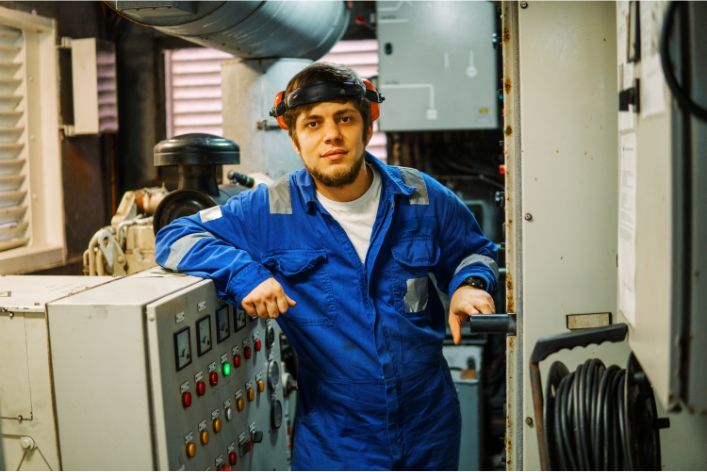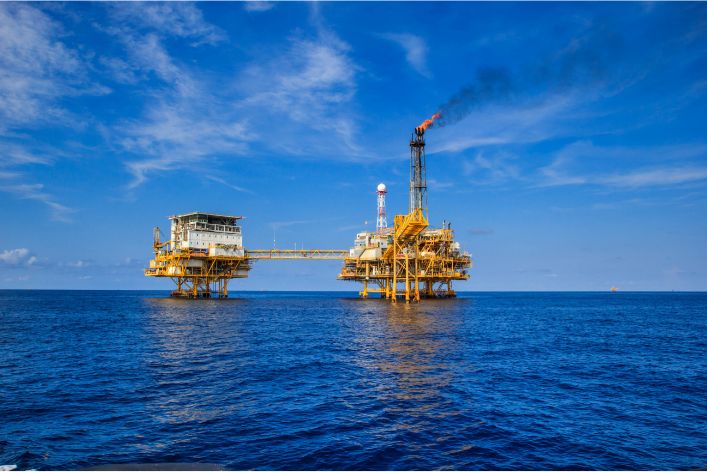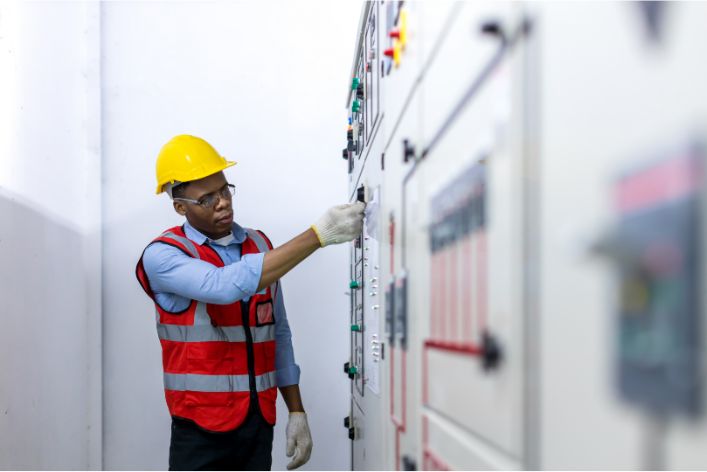Nigeria is known for its vast oil reserves, and offshore oil rigs are essential for the country’s economy. These rigs are located in the Gulf of Guinea and contribute significantly to Nigeria’s GDP.
However, operating and maintaining these rigs is no easy task. The hostile marine environment and the extreme conditions demand the expertise of marine engineers.
Marine engineers play a vital role in ensuring the smooth operations of offshore oil rigs. They are responsible for designing, building, installing, and maintaining the oil rig’s mechanical and electrical systems.
Moreover, marine engineers monitor and troubleshoot the rig’s systems in real time. They also need to ensure that rig personnel can evacuate the rig safely in case of emergencies.
In Nigeria, several offshore drilling companies employ marine engineers, who work tirelessly to ensure the rigs’ smooth operations. These engineers remain up-to-date with the latest technology and ensure compliance with safety regulations.
Without marine engineers, the oil rigs’ operations would be severely affected, leading to significant economic losses for Nigeria. The importance of their work cannot be overstated in maintaining and operating these rigs.
Marine engineers in Nigeria play a crucial role in ensuring the country’s offshore oil rigs operate safely and efficiently. Their expertise and experience are essential in maintaining Nigeria’s economy and affirming its position as the largest oil producer in Africa.
Read: The Career Path of a Reservoir Engineer in Nigeria’s Oil Sector
The Role of Marine Engineers in Offshore Oil Rigs
Marine engineers play a critical role in the successful operations of offshore oil rigs. They are responsible for the maintenance and repair of machinery and equipment that keeps the rig running smoothly. They ensure that all systems on the rig are functioning correctly.
Marine engineers are responsible for the design, construction, and repair of all the equipment that is used on the rig. This includes everything from drilling equipment to electrical systems and HVAC systems. They also ensure that all equipment adheres to safety regulations.
Discussion of the Specific Skills and Expertise Required for this Role
Marine engineers must have a deep understanding of mechanical engineering and marine technology. They must have a solid understanding of electrical and electronic systems. They should also have experience with hydraulic, pneumatic, and other mechanical systems.
Marine engineers should be knowledgeable in oil rig safety regulations and have experience in implementing them. They must also have excellent problem-solving skills to diagnose and repair problems in machinery and equipment.
These engineers should have excellent communication skills, as they work with other engineers and technicians to ensure that all systems on the rig function correctly. They should be able to communicate complex technical information to both technical and non-technical personnel.
Examples of the Challenges that Marine Engineers Face When Working on Offshore Oil Rigs
One of the biggest challenges that marine engineers face when working on offshore oil rigs is the harsh and unpredictable weather conditions. Weather can impact their work and delay projects. They must deal with high winds, rough seas, and other weather-related challenges.
Another challenge is the extended hours that they have to work. Marine engineers must be available around the clock to ensure that the rig is functioning correctly. They may have to work 12-hour shifts or longer, which can be mentally and physically draining.
The remote location of the rigs is also a challenge. They are often far from shore, making it difficult and sometimes impossible to get supplies or replacement parts quickly. They must be able to solve problems using the resources that are available on the rig.
In short, marine engineers play a critical role in the offshore oil rig industry. They are responsible for maintaining all machinery and equipment on the rig, ensuring that it operates smoothly and adheres to safety regulations.
These engineers require specific skills and expertise, including mechanical engineering, marine technology, and a deep understanding of safety regulations.
They face challenges, such as harsh weather conditions, extended hours, and remote locations, but their work is crucial to the success of offshore oil rig operations.
Read: Opportunities for Chemical Engineers in Nigeria’s Gas Industry
The Impact of Marine Engineers on Nigeria’s Offshore Oil Rigs
Marine engineers play a critical role in the success and safety of offshore oil rig operations in Nigeria.
These professionals are responsible for designing, maintaining, and repairing the various types of machinery and equipment used in offshore oil drilling.
Their expertise is crucial to ensuring that all operations run smoothly and without incidents.
Contribution to the Success and Safety of Offshore Oil Rig Operations
Marine engineers contribute significantly to the success and safety of offshore oil rig operations in Nigeria by designing and maintaining machinery and equipment used for drilling, lifting, and shipping crude oil.
They use their knowledge of structural design, mechanical engineering, and materials science to ensure that all machinery and equipment are in good working order.
Additionally, marine engineers are responsible for carrying out safety inspections on all equipment used at offshore oil rig sites. They perform regular checks to identify potential problems and make recommendations for improvement. In doing so, they help to prevent accidents and save lives.
Read: How to Become a Successful Pipeline Engineer in Nigeria
Expertise in Accident Prevention and Saving Lives
One of the critical roles that marine engineers play is preventing accidents and saving lives at offshore oil rig sites. They use their expertise in engineering, safety, and risk assessment to identify and mitigate potential risks.
For example, marine engineers design and install safety systems, such as fire alarms and emergency shutdown systems, to reduce the likelihood of accidents occurring.
In case of emergency, marine engineers also play a critical role in developing and implementing emergency response plans. They work closely with other professionals, such as emergency responders and safety personnel, to ensure that all necessary preparations are put in place to prevent and manage accidents.
Economic Benefits of Skilled Marine Engineers
Having skilled marine engineers working on offshore oil rigs in Nigeria has significant economic benefits. These professionals ensure that all equipment is well-maintained, leading to the prevention of costly and unexpected breakdowns. By avoiding unplanned downtime, oil companies can maximize their production output, leading to significant cost savings.
In addition, having skilled marine engineers on board helps to reduce insurance premiums for offshore oil rig companies. Insurance companies view competent and experienced personnel as a sign of lower overall risk, leading to lower insurance premiums.
Based on the information discussed, it’s clear that marine engineers play a vital role in the success and safety of offshore oil rig operations in Nigeria.
Their expertise in engineering, safety, and risk assessment helps to prevent accidents, save lives, and ensure that all equipment is well-maintained. Additionally, having skilled marine engineers can lead to significant economic benefits for offshore oil rig companies.
Read: Health and Safety Careers in Nigeria’s Oil and Gas Industry

The Future of Marine Engineering in Nigeria
The future of marine engineering in Nigeria is looking bright as the demand for marine engineers is expected to grow in Nigeria’s offshore oil industry.
This growth will open up a host of opportunities for marine engineers in this field, making it an attractive prospect for those interested in a career in this area.
Opportunities for Marine Engineers in Nigeria’s Offshore Oil Industry
One of the key opportunities for marine engineers in Nigeria’s offshore oil industry is the chance to work on state-of-the-art drilling rigs. These rigs require skilled professionals who can ensure that everything runs smoothly, from the design and construction of the rig to its operation and maintenance.
Another opportunity for marine engineers in this field is the chance to work on complex subsea engineering projects.
These projects involve integrating different engineering disciplines to build and operate equipment in harsh environments.
Marine engineers play a central role in these projects, ensuring that they are designed, built, and operated to the highest standards of safety and quality.
Finally, there is a range of other opportunities available for marine engineers in Nigeria’s offshore oil industry, including roles in inspection, testing, and maintenance, as well as positions in research and development.
Investing in Education and Training Programs
To meet Nigeria’s offshore oil industry’s growing demand for marine engineers, we need investment in education and training. Starting at the school level, focus on science, technology, engineering, and mathematics (STEM) education is crucial.
This foundation enables us to build a pool of talented individuals ready to become marine engineers. At the tertiary level, comprehensive training programs should provide the practical experience and theoretical knowledge required in this field.
These programs must cater to industry needs, equipping graduates with in-demand skills and knowledge. As the offshore oil industry grows, the demand for marine engineers will increase. Hence, by developing a skilled workforce through education and training, we can ensure the availability of professionals for maintaining world-class infrastructure in this challenging environment.
Considering a marine engineering career? Nigeria’s offshore oil industry offers exciting opportunities. By investing in your education and training, you can leverage these opportunities and join this thrilling sector.
Read: Career Spotlight: Mudlogging and its Role in Nigeria’s Oil Field
Conclusion
Marine engineers are indispensable to Nigeria’s offshore oil rigs, ensuring safe and efficient operations. They oversee the maintenance, repair, and installation of crucial equipment like engines, turbines, and pumps, abiding by industry standards.
The absence of marine engineers would trigger frequent rig breakdowns, production downtime, revenue loss, increased accident risk, and potential environmental catastrophes.
Thus, Nigeria needs to invest in marine engineering development, providing training, scholarships, and research funding. Government and private sector collaboration is necessary for fostering an industry-supportive environment.
On a final note, marine engineers’ contributions to Nigeria’s offshore oil industry are invaluable. Without them, the industry would struggle. Recognizing this sector’s importance and supporting its growth is crucial for stakeholders.




